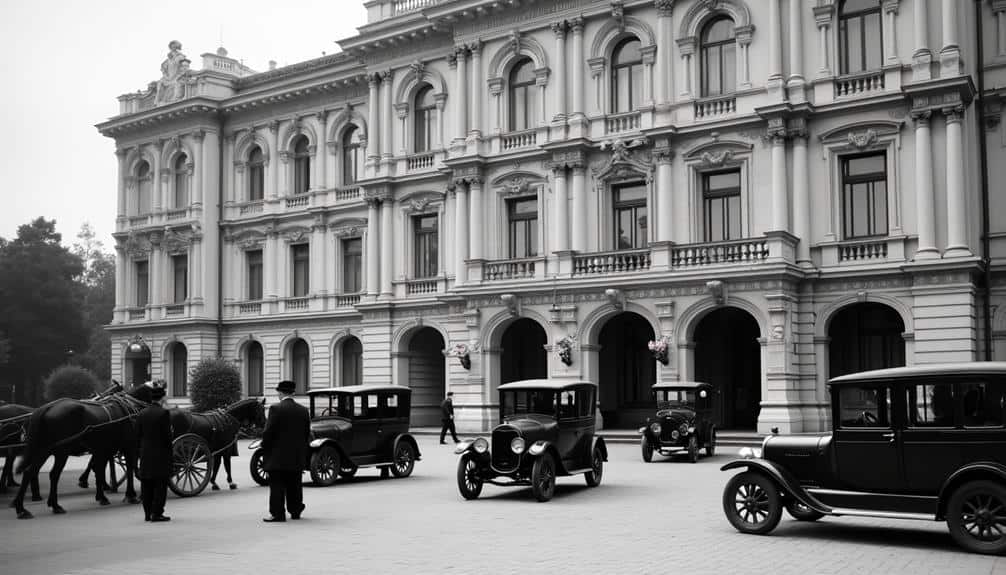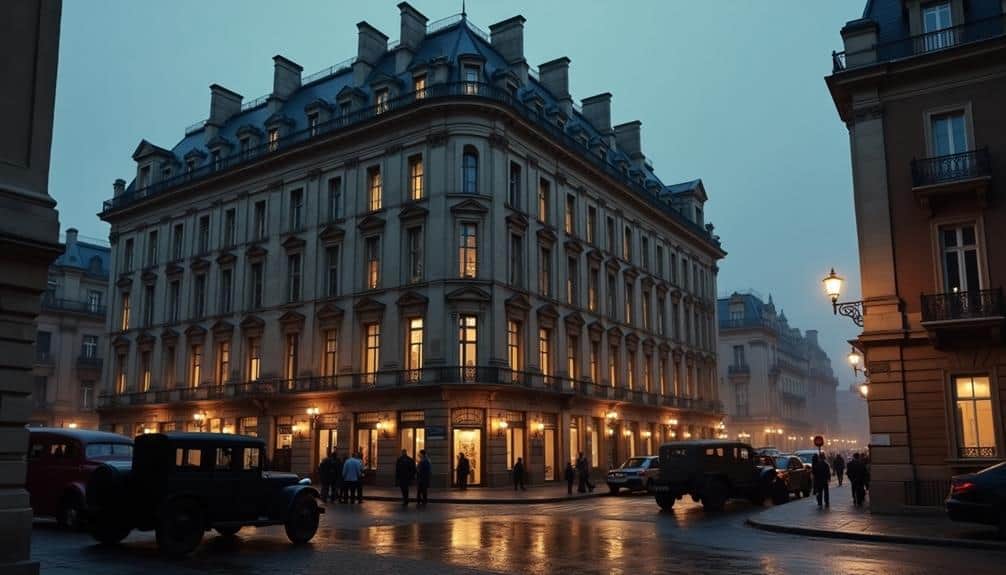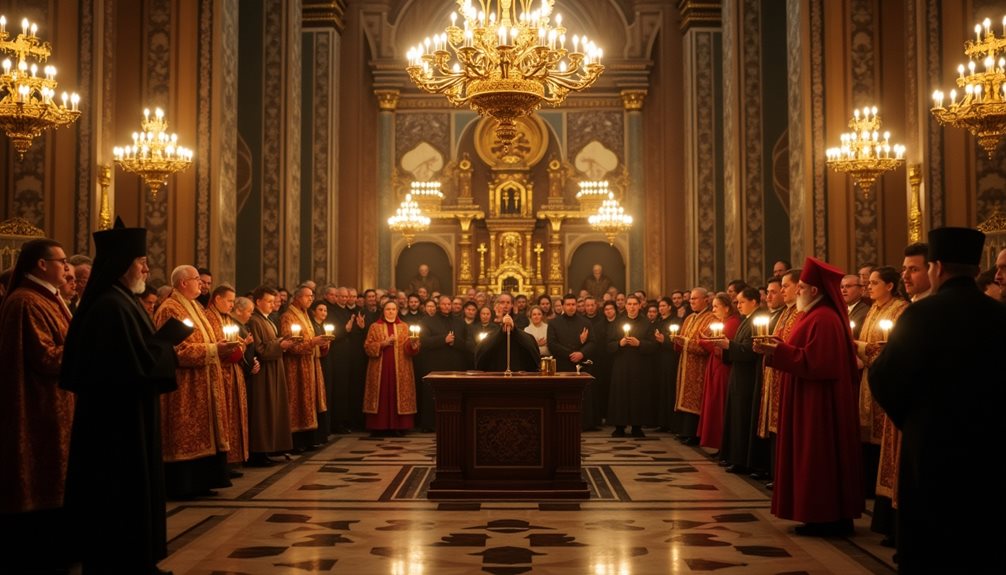Hotel Astoria in St. Petersburg stands as a symbol of early 20th-century luxury, with its exquisite Art Nouveau design enchanting visitors since its 1912 opening. This iconic establishment has not only provided opulent accommodations to political leaders and celebrated artists but has also played significant roles during tumultuous periods, including both World Wars. As we explore the intricate history and evolution of this renowned hotel, from a field hospital to a modern-day emblem of elegance, one cannot help but wonder about the intriguing stories that these walls hold.
Hotel Astoria’s Historical Background

In the heart of St. Petersburg, Hotel Astoria stands as an emblem of early 20th-century opulence and sophistication. Opened in 1912, its architectural style reflects Art Nouveau elegance infused with Russian cultural influences, a reflection of its founding vision of merging Western luxury with local heritage.
Designed by the renowned architect Fyodor Lidval, the hotel was intended to cater to the discerning tastes of international travelers and Russian elites.
The original amenities of Hotel Astoria were unparalleled, boasting marble staircases, plush interiors, and state-of-the-art facilities that set a new standard for hospitality in the city. This dedication to excellence was evident in every aspect of the hotel’s design and service, from its grand ballroom to its intimate dining rooms, which offered exquisite culinary experiences.
The early clientele of Hotel Astoria included aristocrats, dignitaries, and affluent businessmen, drawn by the promise of luxury and the allure of St. Petersburg’s vibrant cultural scene.
The hotel’s founding vision was not merely to provide a place to stay but to create an experience that celebrated the grandeur and sophistication of its era.
Today, Hotel Astoria remains a symbol of timeless elegance and historical significance.
Astoria Hotel: Witness to War and Revolution
 How did Hotel Astoria navigate the turbulent tides of World War I and the Russian Revolution, periods marked by both upheaval and transformation? The iconic establishment became a focal point for war diplomacy, as delegates and officials sought refuge and conducted essential negotiations within its opulent walls.
How did Hotel Astoria navigate the turbulent tides of World War I and the Russian Revolution, periods marked by both upheaval and transformation? The iconic establishment became a focal point for war diplomacy, as delegates and officials sought refuge and conducted essential negotiations within its opulent walls.
Its grand halls and meeting rooms were transformed into venues for revolutionary gatherings, where ideas that would reshape Russia’s future were fervently debated.
During these tumultuous years, the Astoria also served as a key intelligence hub. Covert intelligence meetings were held discreetly, with spies and informants exchanging critical information that influenced wartime strategies. The hotel’s central location and luxurious amenities made it an ideal place for such clandestine activities.
Moreover, the Astoria played a significant role as a propaganda center. The Bolsheviks utilized its facilities to disseminate revolutionary propaganda, rallying support for their cause.
The hotel’s influence extended beyond political machinations; it also became a site for humanitarian aid efforts. As the city grappled with war and revolution, the Astoria opened its doors to provide shelter and support to those in desperate need, embodying a beacon of stability amidst chaos.
As the tumult of World War I and the Russian Revolution faded into history, Hotel Astoria’s prominence did not wane; rather, it found itself once again at the heart of significant wartime events during World War II. The hotel played an essential role, serving as a field hospital for injured soldiers. Its grand halls and luxurious rooms were transformed into wards, where the wounded received vital medical care amid the brutal Siege of Leningrad. This adaptation underscores the hotel’s WWII significance and its enduring commitment to the city’s welfare.
Hotel Astoria’s historical legacy is further marked by a chilling episode involving Adolf Hitler. Confident in his imminent victory, Hitler reportedly planned to hold a grand victory banquet in the opulent surroundings of the Astoria. The banquet, however, never came to pass, as Leningrad’s resilient defense thwarted Nazi forces. This unfulfilled plan has since become a legendary tale, symbolizing the indomitable spirit of the city’s inhabitants.
The war impact on Hotel Astoria was profound, with its walls bearing silent witness to both the horrors of conflict and the defiance of a city under siege. Its role during World War II remains a poignant chapter in its storied history.
Post-Soviet Transformation of Hotel Astoria
The dissolution of the Soviet Union in 1991 heralded a new era for Hotel Astoria, ushering in a period of significant transformation and modernization. As the nation shifted from a state-controlled economy to a more open market, the hotel initiated an ambitious journey of luxury renovations. This overhaul aimed to blend post-Soviet architecture with modern amenities, revamping its historic grandeur while meeting contemporary standards of comfort and opulence.
The renovations at Hotel Astoria were not merely aesthetic; they marked a cultural revival, breathing new life into a storied institution. This period saw the restoration of intricate details that had been lost or neglected during Soviet times, making the hotel a symbol of Russia’s rich heritage amid changing times.
The economic impact of these renovations was profound, attracting international tourists and business travelers alike, thereby boosting local commerce and hospitality trends.
As part of its evolution, Hotel Astoria embraced the evolving hospitality trends, providing world-class service that caters to discerning global travelers. By intertwining its prestigious past with modern luxury, the hotel has successfully positioned itself as a beacon of cultural and economic resurgence in post-Soviet St. Petersburg.
Modern-Day Hotel Astoria

Today, Hotel Astoria stands as a paragon of luxury and historical elegance in the heart of St. Petersburg. A beacon of refined architectural design, the hotel seamlessly melds classic Russian opulence with contemporary sophistication.
Guests are greeted by an array of luxury amenities including a state-of-the-art fitness center, opulent spa, and tastefully decorated suites, each adorned with contemporary art that pays homage to the city’s rich cultural heritage.
The hotel’s prime location provides unmatched advantages, situated mere steps from iconic landmarks such as St. Isaac’s Cathedral and the Hermitage Museum. This central positioning allows guests to immerse themselves in the vibrant cultural tapestry of St. Petersburg with unparalleled ease.
Dining experiences at Hotel Astoria are nothing short of extraordinary. The in-house restaurant offers a sumptuous array of Russian and international cuisines, crafted by world-renowned chefs who transform local ingredients into culinary masterpieces.
The elegant Lichfield Bar provides a cozy setting for sampling an extensive selection of premium spirits and wines.
In essence, Hotel Astoria is not just a place to stay, but a gateway to experiencing the quintessence of St. Petersburg’s luxury and historical grandeur.
Hotel Astoria’s Cultural Significance
Hotel Astoria in St. Petersburg has hosted an impressive array of notable figures, reflecting its enduring popularity and cultural significance.
From political leaders like Winston Churchill to renowned artists such as Mikhail Baryshnikov, the hotel has been a preferred destination for distinguished guests over the decades.
Renowned for its rich history and cultural importance, Hotel Astoria in St. Petersburg has captivated tourists with its blend of timeless elegance and modern comfort. The hotel’s architectural style, a splendid example of Art Nouveau, draws visitors who appreciate historical grandeur. Its proximity to major nearby attractions such as the Hermitage Museum and St. Isaac’s Cathedral makes it an ideal base for exploring the city’s cultural heritage.
Guests at Hotel Astoria are treated to an array of cultural events that reflect the vibrant spirit of St. Petersburg. From classical music recitals to contemporary art exhibitions, the hotel serves as a cultural hub, offering enriching guest experiences.
The local cuisine at the hotel’s restaurant is another highlight, providing authentic Russian flavors crafted from traditional recipes, further enhancing the cultural immersion.
The hotel’s allure extends beyond its physical beauty and culinary delights. Its storied past and the notable figures who have stayed there add a layer of historical intrigue.
As a result, Hotel Astoria remains a preferred choice for discerning travelers seeking a luxurious stay steeped in cultural significance. This enduring popularity underscores the hotel’s status as a cherished landmark in St. Petersburg.




